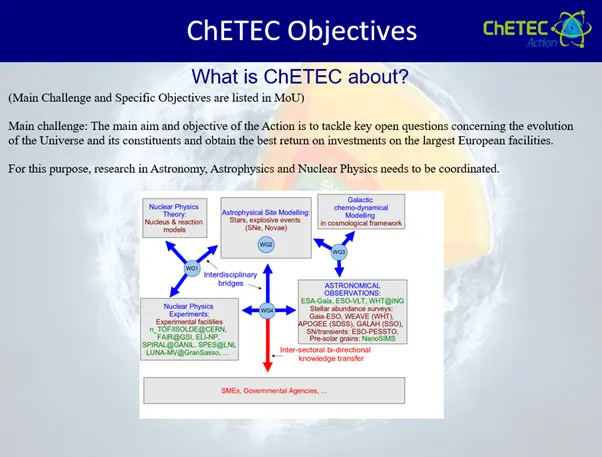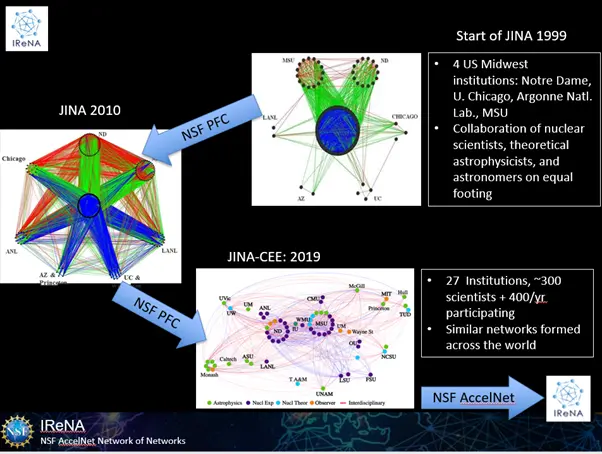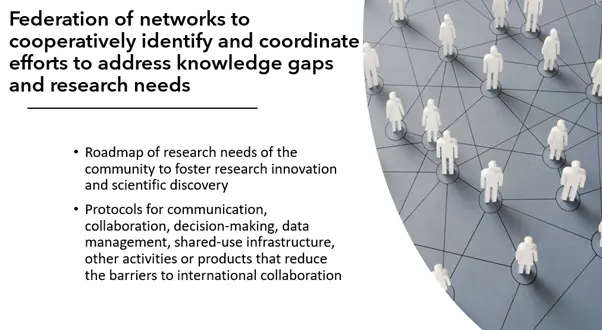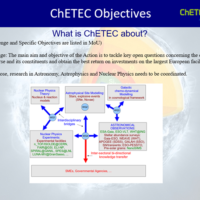The final conference for COST Action ChETEC highlighted the critical importance of international networks in furthering research in the field of astronomy and nuclear astrophysics.
As part of the final conference a dedicated workshop took place on 9 September. The event was held as a hybrid meeting with participants connecting virtually across the world, including as far afield as Japan and the USA.
Raphael Hirschi, the Action Chair opened the event, discussing the synergistic benefits of international cooperation between networks.
“Science creates connection over continents and COST feeds into this”
He discussed the main challenges faced by research networks, such as project inertia and effective tracking and then countered these difficulties by reflecting on the potential of networks to achieve success, finishing on what could be done to take networking activities even further as a research tool.

Hendrik Schatz professor of Nuclear Astrophysics at Michigan State University, then presented the International Research Network for Nuclear Astrophysics (IReNA), explaining the scope of the initiative and highlighting how ‘Networks are critical for rapid scientific progress in nuclear astrophysics as they connect the ever changing and extraordinarily broad range of expertise and capability needed across nuclear science, astronomy and computational physics.’ COST Action ChETEC being part of the IReNA network clearly demonstrates how funding from both the US and EU can be combined to great success.

“You have an existing network and mechanism that you can plug into. When you create a network, there is always the challenge of how to plug in a new actor into the existing one. Identifying the pathways makes it much easier to integrate”
A US approach to accelerating research through networks
“As we are asking projects to tackle grand challenges, there are obviously stakeholder groups that need to be involved in these networks.”
Joining the event virtually from the USA, Claire Hemingway from the NSF, explained the work of AccelNet, which stands for Accelerating Research through International Network-to-Network Collaborations, a programme to prepare US students, postdoctoral researchers and early-career researchers for success in conducting and leading multiteam international collaborations.
“It is important to reduce the barriers to international collaboration and build on collective knowledge; research networks need to be core entities and having an open nature is critical. AccelNet does this by funding the process of building international networks of networks, not the research it conducts.”

Final thoughts
During the final session of the meeting, a Q&A and general discussion was held, where the challenges and opportunities in international cooperation were discussed, including the advancement of virtual networking due to COVID-19 and the challenges that this brings, such as having participants in different time zones. Another aspect discussed, was the importance of inclusion and increasing collaboration opportunities for less research-intensive countries through programmes such as COST and the necessity of joint funding to ensure financial viability of global collaboration.
“Another idea that emerged during the conference was having more formal collaboration between COST in Europe and the National Science Foundation in the USA. That could translate into joint calls, or at least in matching call calendars so that researchers in different continents can synchronize their efforts.” Nuclear astrophysicists call for a joint global effort — ChETEC
About ChETEC
COST Action ChETEC (pronounced ketek), is an acronym for Chemical Elements as Tracers of the Evolution of the Cosmos. The Action network started in April 2017. The main aim and objective of the Action was to tackle key open questions concerning the evolution of the Universe and its constituents by maximising the scientific and innovative return of European investments by building pan-European interdisciplinary bridges amongst the fields of astronomy, astrophysics and nuclear physics and then creating links with SMEs who could provide technological tools to exploit data, software and other techniques. The Action also aimed to train a new generation of European scientists providing inter-disciplinary expertise and knowledge-transfer skills with the aim of strengthening the Innovation Union.
Inspired to join or propose a COST Action?
COST creates spaces where scientists are in the driving seat (bottom-up) and ideas can grow through a flexible and open approach. By enabling researchers from academia, industry and the public and private sector to work together in open networks that transcend borders, COST helps to advance science, stimulates knowledge sharing and pools resources.
Browse all of our running COST Actions to find a research network to join here, or alternatively propose your own network; The Open Call deadline is 29 October 2021.
Further reading
Chemical Elements as Tracers of the Evolution of the Cosmos ChETEC CA16117
